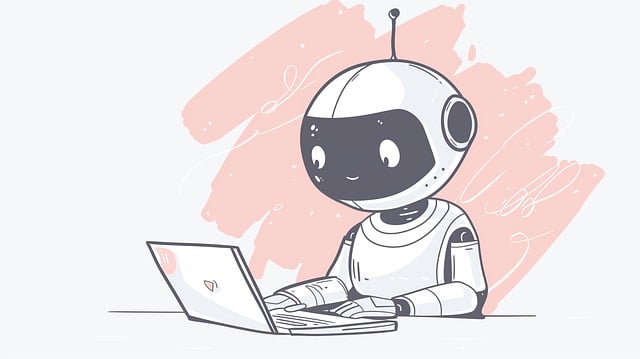AI chatbots, powered by NLP and machine learning, have evolved from basic text conversations to dynamic, personalized systems that revolutionize industries. They cater to diverse applications like customer service, healthcare, and creative writing, enhancing user experiences, streamlining processes, and making information more accessible. While offering numerous benefits, the rapid growth of AI chatbots raises critical challenges such as data privacy, security biases, and employment impacts. The future holds promising innovations, including advanced NLP for human-like conversations, personalization, and voice-activated technologies.
“Discover the dynamic world of AI chatbots—an ever-evolving technology revolutionizing communication and assistance. From their foundational concepts to cutting-edge developments, this article offers a comprehensive overview. Explore the evolution of OChatbots, unraveling their transformative journey. Uncover diverse applications in daily life, alongside ethical considerations shaping their future. Delve into the trends and prospects redefining AI chatbot development, as we gaze into the horizon of human-machine interaction.”
- Understanding AI Chatbots: A Comprehensive Overview
- The Evolution of OChatbot Technology
- Benefits and Applications in Everyday Life
- Challenges and Ethical Considerations
- Future Prospects: Trends Shaping AI Chatbot Development
Understanding AI Chatbots: A Comprehensive Overview

AI chatbots have transformed the way we interact with technology, offering a diverse range of applications that cater to various needs and preferences. These intelligent virtual assistants leverage advanced natural language processing (NLP) algorithms and machine learning techniques to comprehend and respond to human queries in real-time.
An ochatbot is not just a simple text-based conversation; it’s a dynamic system capable of adapting to user inputs, learning from interactions, and providing personalized responses. Whether it’s answering customer inquiries, offering technical support, or even assisting with creative writing tasks, AI chatbots are revolutionizing industries by streamlining processes, enhancing user experiences, and making information more accessible than ever before.
The Evolution of OChatbot Technology

The evolution of AI chatbot technology has been nothing short of remarkable. Starting from simple rule-based systems that could only handle predefined tasks, oChatbots have made enormous strides in recent years. Today, advanced AI chatbots leverage natural language processing (NLP) and machine learning algorithms to understand and generate human-like text, enabling them to engage in complex conversations on a wide range of topics.
This transformation has been driven by the increasing availability of vast amounts of data and computational power, allowing developers to train more sophisticated models. As a result, oChatbots are becoming increasingly adept at handling context, learning from user interactions, and providing personalized responses. They are no longer confined to customer service roles; instead, they are being integrated into various sectors, including healthcare, education, and entertainment, to enhance user experiences and drive efficiency.
Benefits and Applications in Everyday Life

AI chatbots have transformed the way we interact with technology, offering a plethora of benefits and applications in our everyday lives. These intelligent virtual assistants can handle a wide range of tasks, from answering simple queries to providing complex solutions. They are designed to understand natural language, making communication intuitive and human-like, thus breaking down barriers between users and machines.
One of the most significant advantages is their accessibility; AI chatbots are available 24/7 via various platforms, including websites, mobile apps, and messaging services. They can assist with customer support, providing quick responses to common questions, which improves user satisfaction. Moreover, these chatbots can learn and adapt based on user interactions, ensuring personalized experiences. Whether it’s scheduling appointments, booking travel, or seeking information, AI chatbots enhance efficiency, convenience, and productivity in our daily routines.
Challenges and Ethical Considerations

The rise of AI chatbots has brought about a revolution in human-computer interaction, offering unprecedented convenience and accessibility. However, this rapid advancement also presents several challenges and ethical considerations that require careful attention. One primary concern is data privacy and security; as these chatbots rely on vast amounts of user data to learn and improve, ensuring the protection of sensitive information becomes paramount. Developers must implement robust measures to safeguard user data from breaches or unauthorized access.
Furthermore, AI chatbots may inadvertently perpetuate biases present in their training data, leading to unfair or discriminatory responses. This issue underscores the importance of diverse and inclusive datasets to foster more equitable chatbot behavior. Additionally, the potential impact on employment is a topic of ethical debate; as these technologies automate certain tasks, there are fears of job displacement, necessitating discussions on reskilling and adapting to a future with AI-augmented workflows.
Future Prospects: Trends Shaping AI Chatbot Development

The future of AI chatbots is brimming with potential as developers continue to push boundaries and explore innovative trends. One prominent trend involves enhancing natural language processing (NLP) capabilities, enabling ochatbots to understand context, nuances, and complex user queries more effectively. This advancement will result in more accurate and human-like conversations. Additionally, integration of machine learning algorithms allows AI chatbots to learn and adapt from each interaction, improving their performance over time.
Another exciting prospect is the growing emphasis on personalized experiences. AI chatbots are being designed to remember user preferences, provide tailored recommendations, and offer customized support, thereby increasing user satisfaction and engagement. Moreover, as voice-activated technologies gain popularity, we can expect a surge in voice assistants and conversational interfaces, making AI chatbots more accessible and convenient for users across various devices and platforms.
AI chatbots have evolved significantly, transforming from simple rule-based systems to advanced models capable of natural language understanding. As we’ve explored in this article, AI chatbots and ochatbots offer a multitude of benefits across various sectors, from customer service to healthcare. However, navigating the challenges of ethical implementation and ensuring their responsible development is crucial for maximizing their potential while mitigating risks. The future of AI chatbots looks promising, with emerging trends suggesting even more sophisticated applications in our everyday lives.
